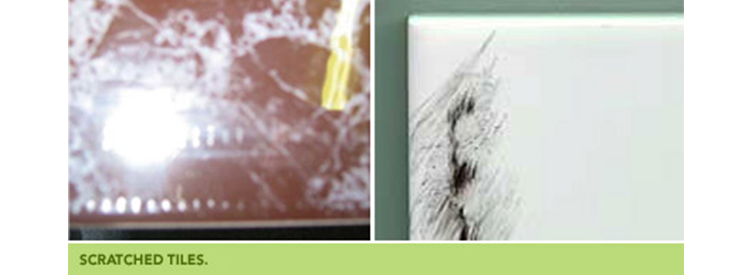
During freight and delivery, glossy tiles can become scratched.
This can happen if two tiles are rubbing against each other during freight and transport. If this does happen, it is usually with wall tiles that have a softer glaze than the tougher floor tiles. For this reason, when Ranjanas Ceramic pack part box quantities ordered for a project, we tape the loose tiles together and pack them face to face.
Naturally, we do not want scratched tiles to be installed in your home, and neither do you.
No-one wants scratched tiles installed in their new home. Scratched tiles are more likely with glossy wall tiles and the scratches usually happen while in transport.
Your tiler should not install any scratched or damaged tiles. It is standard practice and the responsibility of the tiler to put any damaged tiles aside.
In the Standards, a scratch is defined as such when it can be observed easily from normal viewing distance. A scratch on a floor, for example, would need to be seen without bending overs from a standing position. If you need to get close to the tile to find the scratch, technically, it is not a scratch.
If the tiles have not been installed, contact the Ranjanas Ceramic Branch from which you purchased them. We will arrange to exchange the damaged tiles, or credit them if you prefer.
If the tiles are installed, there are two options to consider. The best option is for the tiler to replace the scratched tiles. These should not have been installed, so the tiler should repair the job before completion.
In specific circumstances, with small amounts of scratching, a glass repair service can remove some scratches from tiles, the same way scratches in glass can be repaired.